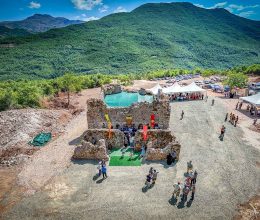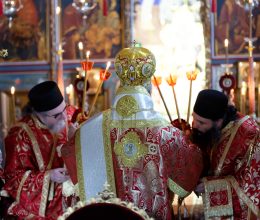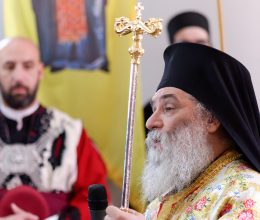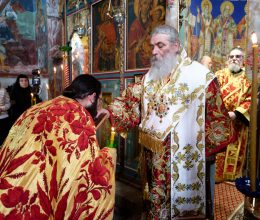A homily given by His Grace Bishop Partenij of Antania on the Sunday of Gregory Palamas in Rajčica Monastery, March 20th in the year of Our Lord 2022.

Download a sermon to your device
Сечесни отци,
Сепреподобни и преподобни браќа монаси и сестри монахињи,
Почитувана Министерке за одбрана г-ца Славјанка Петровска,
Мили мои браќа и сестри,
The Church dedicates the Second Sunday of Holy and Great Lent to Saint Gregory Palamas, the Wonderworker of Thessaloniki. As we read in his wonderful biography written by Patriarch Philotheus of Constantinople, he lived in the 14th century and indisputably left behind a big mark on Orthodox theology. He imparted to us a particularly essential theological notion which completes the formation of Orthodox trinitarian dogma. He was perfectly acquainted with the uncreated light of Tabor, in which we are all called to participate through communion with the uncreated Divine energies. The primary teaching of this great theologian and saint of our Church is that our entire life should be a progression towards theosis, meaning participation in the Godhead by participating in His divine energies, so that we may finally attain to the eternal communion of joy in the Kingdom of God.
In the Gospel reading appointed for this Sunday, we heard about Christ’s miracle on the paralytic. His friends strongly believed in the Nazarene and took the paralytic to Him in a very unusual way. They believed so firmly in Christ and His power to work great miracles that when they were faced with a huge crowd of people that prevented them from bringing their paralyzed friend to the Healer, they decided to tear off the roof of the house where He was staying and to use ropes to lower the stretcher of the sick man before Him. The Lord Christ, on seeing their faith, perseverance, and sacrifice, healed the paralytic with the words: “Son, your sins are forgiven you!” He performed this healing because of the faith of his friends. This is why the Evangelist emphasizes: “When Jesus saw their faith, He said to the paralytic” (Mark 2:5). Those of you who read the Gospel know that Christ, as a condition for performing a miracle or healing, always required faith from people. In this case, however, He was amazed not only by the faith of the friends of the sick person, but also by their sacrifice, their active love for their friends, and therefore immediately heals the paralytic.

With this saving event, Christ shows us what the Church actually is. He presents it to us as a community of heartfelt sacrifice between all its members. He rejoices and is moved when we sacrificially patiently bear with one another in our trials. He leaves us the message to love one another just as He loved the world, on the behalf of whom He sacrificially crucified Himself. It is in this light of His love that we should look at every person in the world and especially every Christian who partakes of the Body and Blood of Christ. The Apostle Paul, wanting to emphasize this even more strongly, says that all of us Christians are members of the same body, members dependent on one another: “For as we have many members in one body, but all the members do not have the same function, so we, being many, are one body in Christ, and individually members of one another” (Romans 12:4-5). In another place he says, “For we, though many, are one bread and one body, for we all partake of that one bread” (1 Corinthians 10:17). Consequently, no matter how small and insignificant an organ in our body may seem, if that organ is sick, then our whole body will be sick. All other organs will suffer because of one diseased organ. In that sense, we are all members of this spiritual edifice, the Church of Christ, and God expects us to care for one another. We must not let anyone suffer alone. If someone is suffering, we must turn their pain into our pain. This is what a true Christian is, to take upon oneself the sufferings of others, empathize with them, understand them, and accept them with love in their trials. This is how the friends of the paralytic in today’s Gospel passage acted.
In the last few days, many came for confession, and first I told them that it is necessary to be human first and foremost. Being a Christian is such a lofty thing, thus first of all a person must attain to the level of humanity as a God-given quality. Unfortunately, we see that in our time many nominal Christians can hardly even be called people, let alone Christians. We devour each other, condemn, slander, and envy each other instead of covering for one another, helping, building up, and carrying each other to salvation in Christ. God is repulsed by nothing more so than condemnation. That’s why when we condemn someone, He allows us to fall into the same and even greater sins, and thus He teaches us not to judge and to humble ourselves. What pleases Christ is when we have compassion for every person who suffers, which in fact is every person alive because there is no human being that does not have some kind of suffering in themselves. When we act with love towards our neighbor, then the One Who most of all suffers with mankind heals us all with His Divine Mysteries, seeing our willingness to help and sacrifice ourselves. The greatest of these Divine Mysteries, the crown of all, is the Holy Eucharist, with which the Son of God gives Himself to us individually. He deifies us and makes us his brothers and sisters, as St. Gregory Palamas very beautifully explains.
Let us ask our father and teacher on the path to theosis, St. Gregory Palamas, to entreat God for mercy and enlightenment for us, so that a desire to commune with the uncreated light of God in the beauty and joy of God may appear among all Christians! Amen!















